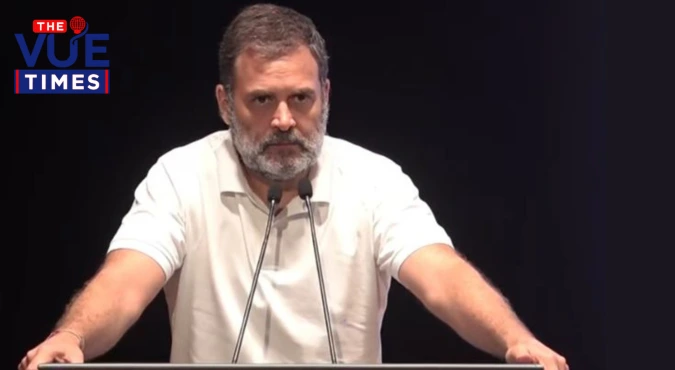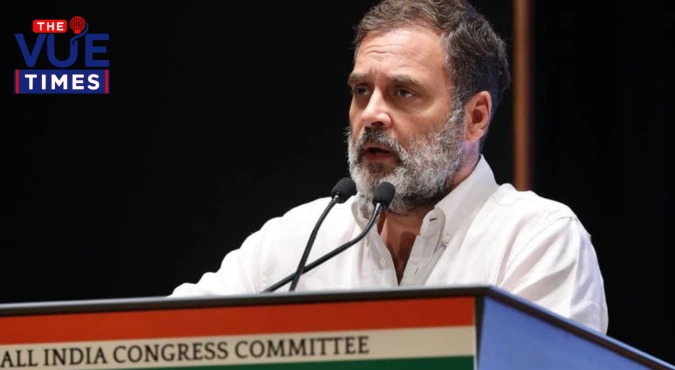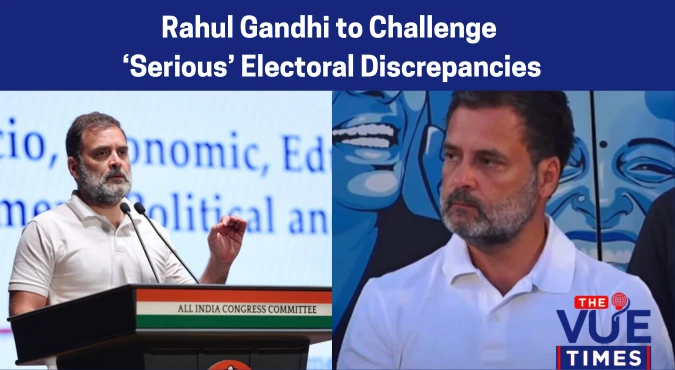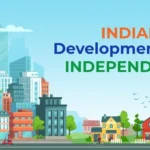A High-Stakes Battle for India’s Democracy
“By the seat of his pants,” in the center-stage of New Delhi, under the disapproving nose of pictures of his deceased father Rajiv Gandhi and grandmother Indira Gandhi, opposition leader Rahul Gandhi has set one of his greatest tests yet to the Indian electoral machine. Referring to the system that is wracked with “severe discrepancies”, the scion of the Congress Party vowed to make the battle live in terms of mass mobilization, from time to time, monitoring, and even legal recourse as might be needed.
It is politically important timing. One of the most politically tense and strategically important states in India, Bihar will go to elections by November 2025. The election is turning out to be a slim-margin affair between allies of Prime Minister Narendra Modi and his Bhartiya Janata Party (BJP) and the opposition alliance, INDIA led by Congress.
To Gandhi, this is not just about Bihar, it is about setting the stage for the 2029 national election
and crashing the conversation on whether India has the viable democratic institutions.
The Core Allegation: Manipulated Voter Rolls
Rahul Gandhi is mainly accusing that the voter lists of India have been corrupted, by means of adding the names of fake voters to various constituencies in the 2024 general elections, and subsequent state elections.
The BJP and the Election Commission of India (ECI) have denied such conjectures point-blank, but according to Gandhi, internal studies of Congress show such trends, which require public awakening and redress.
“Fatal flaws exist in the voting system, and we shall continue to highlight them. We do not wish to discredit the process and we are doing it slowly and with deliberation,” he informed the reporters.
This Congress approach is strategic-leave the problem simmering in the minds of the populace without boiling it to a point that would eventually turn down the faith in the entire system of elections.
Political Context: BJP’s Post-2024 Position
When BJP went into 2024 national elections it was looking to get a third consecutive term with a commanding majority. Even when it still had power, the party did not meet its expectations as it needed to be joined by regional allies so that the government could be formed.
But in subsequent months after the national vote, BJP recovered momentum, winning some state elections. According to analysts, this recovery has toned down the attitude of the people against a weak BJP and the onslaught by the opposition on electoral credibility of a weak BJP has become difficult to sustain devoid of any clear cut evidence.
Nonetheless, the Vote Vibe poll in Bihar indicates a negligible lead of the opposition, mainly because of unemployment and rural economic hardship, not the issue of overall electoral integrity.
Bihar: The Upcoming Litmus Test
The significant role of Bihar in the political sphere could hardly be overestimated:
● 40 seats in Lok Sabha-2 States (or fourth largest state in parliamentary
representation).
● Traditionally a kingmaker coalition.
● A state that possesses a highly politicized electorate and has traditions of high
voter turnout.
The state, under the government of an alliance of BJP and Chief Minister Nitish Kumar Janata Dal (United), is now grappling with unemployment, rural poverty and infrastructure, and these elements of maladjustment the opposition plans to use as weapons.
Rahul Gandhi, full of his visible confidence said:
“The Bihar election is looking very close, but we are rising and they are declining.”
Provided that the Congress and its partners in its bloc manage an upset in Bihar, it stands to re-charge the opposition narrative and determine the tone of the next four years of governance.

The Institutional Clash: Congress vs. Election Commission
The Election Commission of India (ECI) has always been considered as one of the foundations of Indian democracy but recent times have emerged when opposition parties have blamed ECI for its unacceptable neutrality.
The comments by Rahul Gandhi contribute to a debate now years old over election transparency:
● Electronic Voting Machines (EVMs) have been placed under repeated inquiries with demands of incorporating verification with paper ballots.
● The claims of partisan application of Model Code of Conduct during campaigns.
● Questions associated with voter roll maintenance, such as removing of valid names and the subsequent introduction of fictitious ones.
This refusal by the BJP and the ECI to accept any form of wrongdoing aligns with their long-held stance that Indian elections are among the largest, most secure, and most open elections in the world.
Public Mobilization: Gandhi’s Strategy
Gandhi has stated that the main field of the battle of his party will be the opinion of people. The targeted outcome is to build a long term pressure that:
1. Compels the ECI to report against certain anomalies.
2. Increases grassroots vigilance of voters.
3. Foments grassroots outcry that would render legal prosecution politically more powerful.
By presenting the problem as something belonging to the people, but not a solely partisan complaint, Gandhi tries not to lay the undecided voters open, which the potential electoral complaint could be perceived as anti-national.
Legal Pathway: From Street to Courtroom
Public campaigns still remain focal but Gandhi has not closed the door in reference to judicial intervention.
This may be in the form of:
● ECI against public interest litigations (PILs).
● Calls of independent audits of the voter lists.
● Demands of court-observed electoral reforms.
The Indian Supreme Court has never been keen on interfering in the process of election unless there is substantial prima facie evidence. Congress would hence need a piece of carefully documented data in any legal action.
Pros and Cons of Rahul Gandhi’s Stand
Pros
1. Empowering Democracy: Elections Transparency: Transparency can be increased through investigation of elections by people.
2. Voter Awareness: Voter Awareness can be conducted to stimulate citizens to check on their voter registration details.
3. Accountability Pressure: Makes the Election Commission and the ruling party remain sensitive to the opinion of people.
4. Opposition Cohesion: Something that all of the INDIA bloc can be united over.
Cons
1. Threat of Backfire Allegations: It can be converted into the style of sour grapes without concrete reasons.
2. Erosion of Institutional Trust: There is a threat of decrease in public trust in the elections due to the excess focus on finding faults.
3. Polarization: May worsen the political identities before state and national elections.
4. Drawing Attention Away of Policy: Policy debate may draw attention away to other more urgent economic issues.
The Larger Question: Is India’s Electoral System Under Threat?
It is a monumental undertaking in India: the elections take place over weeks, and hundreds of thousands of officials are involved, not to mention the more than 900 million registered voters. Errors are bound to happen since the scale is just so enormous as to be almost immune.
But administratively messed up or politics is a political bombshell.
It frequently is observed by independent electoral observers:
● Small differences are frequent but seldom vary massive margins.
● Lower level malpractices like vote-buying or intimidation are more difficult to track.
To the voters, the difficulty is how to weave apart valid systemic fears with political rhetoric that seek to mobilise partisan constituencies.

The Road Ahead: Bihar and Beyond
With the election campaign searing in Bihar, look forward to:
● Increasing party oversight of voter rolls.
● Litigation claiming irregularities and counter-claims.
● The brute force of social media campaigns aimed at detection of electoral trust problems.
On his part, Rahul Gandhi will be vindicated or discredited depending on what happens in the Bihar election with his anticipation of a rigged game playing out in one way or another failed.
In any case, the controversy concerning the integrity in elections in India is now squarely on the national agenda-an issue that could resonate in the 2029 cycle around the national elections.
Conclusion
The allegations laid by Rahul Gandhi have become an iconic event in the political setting of India. Evidence, participation and the outcomes in Bihar will make all the difference whether the platforms they create lead to significant reform or are forgotten like political clatter.
One thing is clear: The Indian democracy, though of monumental dimensions, is not invulnerable to the criterion of credibility and the criterion is at the front and center of one of the most followed political fights in India.









